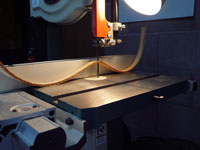The Components of a Classical Guitar
 I
am building Classical Guitars. These are light-weight
nylon-string guitars that follow the instrument design as it evolved
from
the Spanish builders of the 19th and early 20th century. I closely
adhere to shape, dimensions and appearance of these guitars, but I am
using state-of-the-art building methods and modern materials (such as
carbon fiber reinforcements in the neck and bracings) where
appropriate. These guitars typically have 6 strings
(E330-B247-G196-D147-A110-E83), but they can also be built with 7
strings by adding an additional bass string, generally tuned to D74.
The neck has 20 frets with
the 12th fret at the edge of the body of the guitar. Default string
length is 650mm, but string lengths between 630 and 660mm are used.
I
am building Classical Guitars. These are light-weight
nylon-string guitars that follow the instrument design as it evolved
from
the Spanish builders of the 19th and early 20th century. I closely
adhere to shape, dimensions and appearance of these guitars, but I am
using state-of-the-art building methods and modern materials (such as
carbon fiber reinforcements in the neck and bracings) where
appropriate. These guitars typically have 6 strings
(E330-B247-G196-D147-A110-E83), but they can also be built with 7
strings by adding an additional bass string, generally tuned to D74.
The neck has 20 frets with
the 12th fret at the edge of the body of the guitar. Default string
length is 650mm, but string lengths between 630 and 660mm are used.
My knowledge about building the Classical Guitar comes from many sources, but the most valuable and important were papers published in American Lutherie, the quarterly journal of the Guild of American Luthiers dating back as far as 1985. There are also two excellent books that have helped me much in understanding the many steps and critical processes in building the Classical Guitar. These are Guitarmaking - Tradition and Technology by William R. Cumpiano and Jonathan D Natelson and Classical Guitar Making - A Modern Approach to Traditional Design by John S. Bogdanovich. I am much indebted to these luthier-authors for the effort they have gone to to explain their methods to the public.
Below I will show how I build
the components of the guitar and
how I assemble them into a complete instrument. I need to point out
that this is not intended to be a course on building guitars. I provide
many highlights of processes and fixtures I use, but there are many
details that I don't go into here. At this point I should also point
out that I am using metric measurements which is the tradition on
Classical Guitars.


